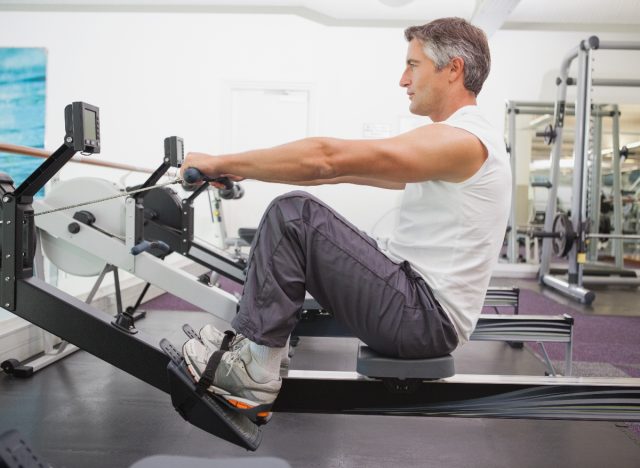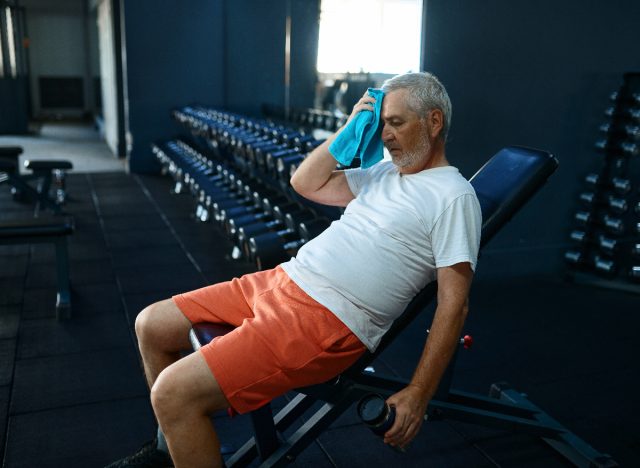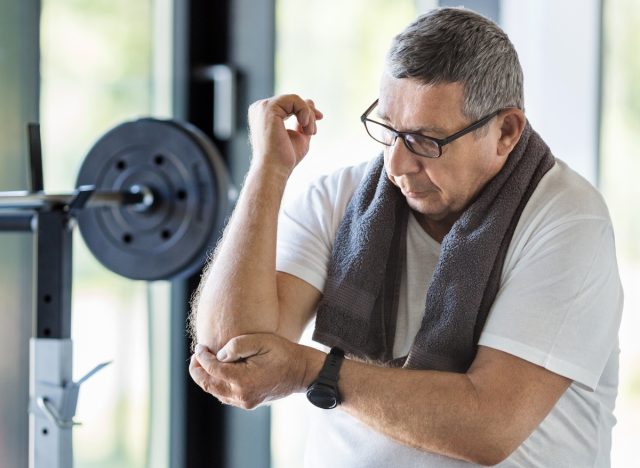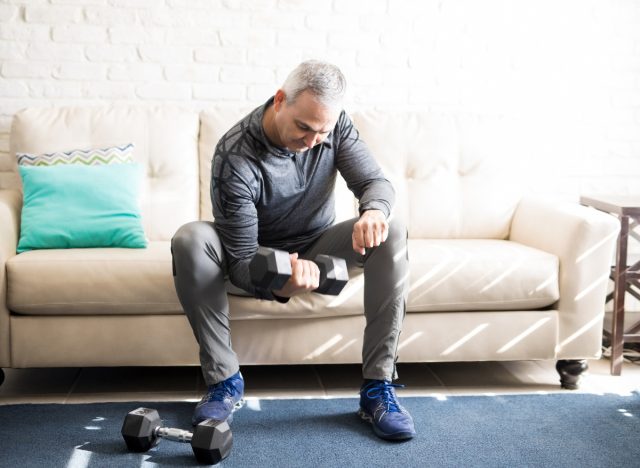Some individuals think that because they’re going to the gym every day to work out, they’re doing wonders for their bodies. That may be true, but did you know there are also some pretty bad exercise habits that destroy your arms after 50? We spoke with Mike Bohl, MD, MPH, ALM, a member of our Medical Expert Board, and have the scoop. Read on to learn what you may be doing wrong and how to fix these errors that wreak havoc on your arms.
Working on keeping your arms strong is so important as you age. You may be astonished to learn that your muscle strength and mass peak when you’re around 30 to 35 years old, the National Institute on Aging reports. You still have a lot of years ahead of you, and it’s important to exercise and keep your limbs in great shape. Just think about how much you use your arm strength for tasks you do on a daily basis, such as reaching for things in a cabinet, carrying your own groceries in and out of the car, lifting your dog into the car for a vet appointment, and pushing yourself out of a chair.
Needless to say, arm day at the gym is essential. But it’s just as important to know the mistakes you may be making that can negatively impact your arms as you age. Dr. Bohl breaks down some of the worst exercise habits that destroy your arms after 50, so keep reading to learn what they are. And next, be sure to check out 9 Exercise Habits That Are Destroying Your Back After 50.


Some exercises may seem like arm workouts, but they in fact are not. A perfect example is exercising on a rowing machine, where the majority of force you use when you pull back should come from the motion of leaning back and straightening both legs—not pulling forcefully using your arms, Dr. Bohl explains.


We all know that engaging in exercise is sheer goodness for your physical and mental health, but it also puts a solid amount of stress on your body. It’s really easy to overtrain your arms without knowing it.
Dr. Bohl warns, “If you’re lifting too much weight too often, you put a lot of stress on your muscles and bones, and this will ultimately lead to fatigue, weakness, and needing to take a longer time to recover.”


If you’re not taking enough time to rest between the sets you perform in workouts or between training days, you’re putting yourself at risk. Dr. Bohl stresses, “If you’re doing back-to-back arm workouts, you could be at higher risk of injury.”
READ RELATED: Unmasking the Disturbing Reality of Verbal Abuse: A Dark Form of Child Maltreatment
You may be inclined to skip through rest days, but do yourself a favor, and give your body the break it needs. It’s a necessary step! According to Medical News Today, rest days help repair and sculpt your muscles, relieve any muscle soreness or pain, restore your body’s energy, and give your mind some time to relax.


There are several arm conditions that are quite common, including tennis elbow, a torn rotator cuff, or carpal tunnel syndrome. “If you are dealing with a current arm condition, you should avoid certain exercises that might make those conditions worse. For example, with a torn rotator cuff, you need to think about how you’re moving your shoulder, such as avoiding raising the arms overhead,” Dr. Bohl advises.


You may not think posture could have a major impact on your workouts, but every single time you exercise, it’s essential to maintain solid form and posture. According to Dr. Bohl, “In general, you should check the five kinetic chain checkpoints—your feet and ankles, knees, hips and pelvis, shoulders, and head. Specifically for the arms, you want to avoid rounding your shoulders forward or elevating them, and you want to keep your head facing forward in a neutral position with the ears in line with the center of the shoulder.”


It’s essential for your muscles to repair after a workout, which requires feeding them with nutrients. “Therefore, even if you’re following a diet, it’s important to eat enough carbs and protein after a workout and throughout the day, so your muscles can recover and be ready again for your next workout,” Dr. Bohl explains.
According to Medical News Today, eating carbohydrates and protein, along with drinking water within a two-hour timeframe of completing moderate or intense exercise can help your body get its energy levels back up.


There are several popular arm exercises, such as bicep curls, that concentrate on one muscle. However, your body doesn’t typically use one muscle at a time. That’s why Dr. Bohl recommends performing compound exercises. He says, “In general, it’s better to do compound exercises that use multiple muscle groups at the same time, including stabilizer muscles. Compound arm movements include hammer curls, rows, chest presses, shoulder presses, and pull-ups.”
Source:








